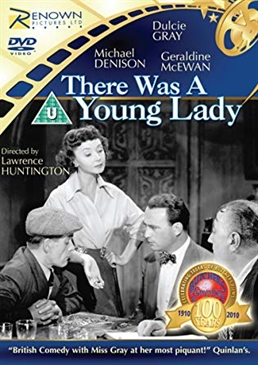There Was a Young Lady: Difference between revisions
No edit summary |
|||
| Line 1: | Line 1: | ||
{{Infobox film | {{Infobox film | ||
| image = There_Was_a_Young_Lady.jpg | | image = There_Was_a_Young_Lady.jpg | ||
| caption = From left to right: Bill Owen, Dulcie Gray, Sydney Tafler and Robert Adair | | caption = From left to right: Bill Owen, Dulcie Gray, Sydney Tafler and Robert Adair | ||
| director = [[Lawrence Huntington]] | | director = [[Lawrence Huntington]] | ||
Latest revision as of 11:20, 23 February 2023
| There Was a Young Lady | |
|---|---|
 From left to right: Bill Owen, Dulcie Gray, Sydney Tafler and Robert Adair | |
| Directed by | Lawrence Huntington |
| Written by |
|
| Produced by | |
| Starring | |
| Cinematography | Gerald Gibbs |
| Edited by | Joseph Sterling |
| Music by | Wilfred Burns |
Production company | |
| Distributed by | Butcher's Film Service (UK) |
Release date |
|
Running time | 84 minutes |
| Country | United Kingdom |
| Language | English |
There Was a Young Lady is a 1953 British comedy film directed by Lawrence Huntington and starring Michael Denison, Dulcie Gray and Sydney Tafler. It was made at Walton Studios and on location in London. The film's sets were designed by the art director Frederick Pusey. Huntington had been a prominent director in the 1940s but after this film he dropped into making second features.[1] The film marked the screen debut of Geraldine McEwan as dim-witted secretary Irene.[2]
Plot
Super-efficient secretary Elizabeth Foster effectively runs a diamond merchant firm. Her boss David Walsh (who inherited the firm from his grandfather, but knows nothing about diamonds) buys a diamond ring from a street vendor, planning to propose to her, but she tells him the diamond is actually paste, and far from worth the £25 he paid. His embarrassment over this causes him to forgo proposing. She tells him of her plan to rescue the firm from its dire financial position, by purchasing the family jewels of a duke David went to school with for £70,000, though they only have to pay £7000 on account; she has a prospective buyer already, who may be willing to pay £90,000. However, he is unwilling to accept how she intends to raise the sum (which includes mortgaging his willing mother's house), so she quits.
She walks out of her office and straight into the midst a smash and grab robbery. Accidentally blocking the back door of the gang's getaway car, she is forced inside by Joe and driven away. She helps the three crooks evade the pursuing police car after being promised her release, but Johnny, their leader, reneges and she is taken to their hideout in rural Sussex, a mansion looked after the uncle of Basher, another of the thieves. There she meets Arthur, the fourth member of the gang. She tips the farm worker who gives them a ride on his hay wagon to the mansion, but the message she wrote on the pound note is only noticed when he tries to spend it in the pub.
Elizabeth, a prisoner until the gang pull off another planned robbery in a few days, sets to improve their living conditions and also proves to know far more about their jewel haul than they do themselves. All her predictions as to how their future smash and grab plan will fail prove to be correct.
The gang, with the exception of Johnny, look up to Elizabeth and treat her very well. She persuades the gang to follow a plan devised by Arthur. To her horror, they rob the wrong place, her former employer, and steal the jewellery David bought from the duke. Worse still, displaying his usual ineptitude, Walsh has neglected to have it insured. Nevertheless, after getting Elizabeth's message, he rescues her and the jewellery.
Several years later, they are happily married and prosperous, having purchased the mansion in which she was imprisoned, with the gang now gainfully employed as their servants.
Cast
- Michael Denison as David Walsh
- Dulcie Gray as Elizabeth Foster
- Sydney Tafler as Johnny
- Charles Farrell as Arthur
- Geraldine McEwan as Irene
- Marcel Poncin as 1st Jeweller
- Robert Adair as Basher
- Tommy Duggan as A.R. Weatherspoon, the pools man
- Bill Shine as Charlie, Duke of Chiddingford
- Bill Owen as Joe
- Kenneth Connor as Tom Bass, the cart man
- Basil Dignam as 2nd Jeweller
- Ben Williams as Man delivering safe
- Janet Butler
- Gerald Rex
- The Tailormaids
Critical reception
Radio Times wrote "Chuckles abound";[3] and TV Guide noted "Decent comedy is slightly better than average, with Gray at her brightest."[4]
References
- ^ Chibnall & MacFarlane p.148
- ^ "Geraldine McEwan". BFI.
- ^ "There Was a Young Lady – review | cast and crew, movie star rating and where to watch film on TV and online". Radio Times.
- ^ "There Was A Young Lady | TV Guide". TVGuide.com.
Bibliography
- Chibnall, Steve & McFarlane, Brian. The British 'B' Film. Palgrave MacMillan, 2009.
External links
- Articles with short description
- 1953 films
- Template film date with 1 release date
- IMDb title ID not in Wikidata
- British comedy films
- 1953 comedy films
- British black-and-white films
- Films directed by Lawrence Huntington
- Films shot at Nettlefold Studios
- Films produced by Ernest G. Roy
- Films shot in London
- Films set in London
- Films set in Sussex
- Butcher's Film Service films
- 1950s English-language films